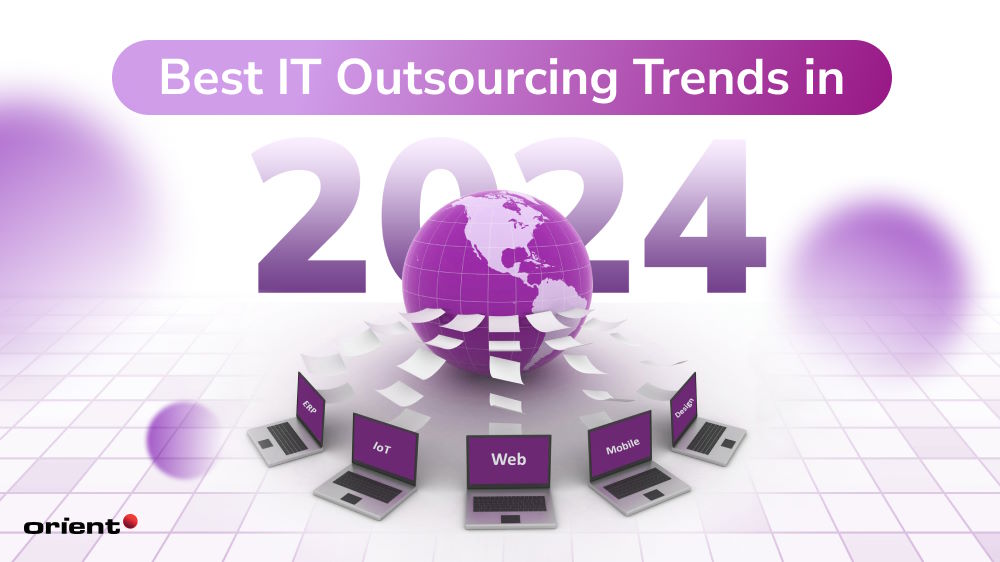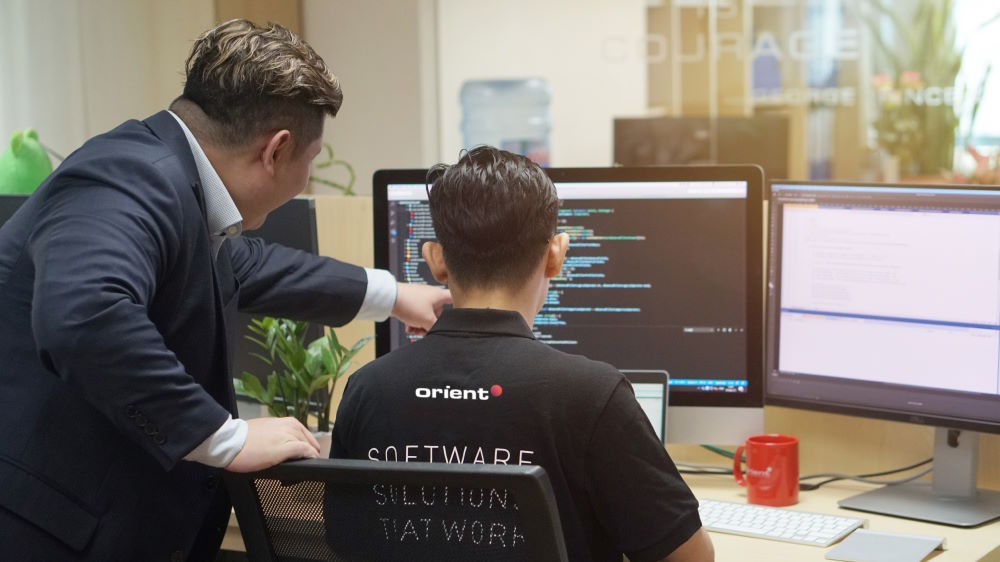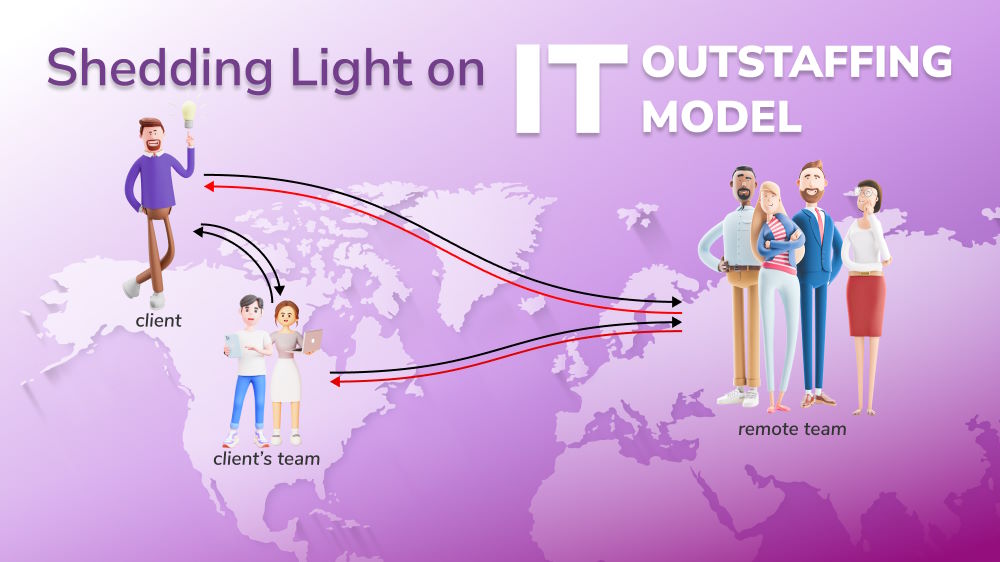Best IT Outsourcing Trends in 2024: Apply Them or Be Backward

Content Map
More chaptersThe global business process outsourcing market size was valued at $261.9 billion in 2022 and is predicted to grow strongly in 2023, with revenue reaching $460.10 billion.
Thanks to accelerated digitalization and the increasing demand for enterprise applications, outsourcing services are gradually becoming a new trend for businesses regardless of size and field of operation. The benefits of outsourcing companies are variable. A reputable outsourcing company completely solves the software development human resources shortage by providing a wide range of talent pools available from different countries. Thanks to this service provider, enterprises can focus on the core competencies during their business processes and save internal resources and costs simultaneously.
However, have you approached the outsourcing industry properly? The way the world works, the ever-changing needs of your target audience, and the rapid evolution of technology have a huge impact on how you use outsourced services. To be a leader in the trend and create a competitive advantage, more than anyone else, businesses need to understand the top IT outsourcing trends and apply them to the operational process and software solutions. Without further waste, let’s explore the current outsourcing trends below.
IT Outsourcing Trends You Will Witness in 2024

#1 Outsource Business Processes in Southeast Asia
If you have researched the outsourcing industry, you must have once heard of names like India, China, Ukraine, etc., when they are among the top countries for outsourcing software development. However, when nearshore outsourcing models have recently become a trend, businesses have more choices when other potential regions like Southeast Asia appear on such top lists with increasingly dense frequency.
There are many reasons why companies outsource their business operations in Southeast Asia:
- Cost Savings: The labor costs in Southeast Asian countries, especially Vietnam, are much lower than in other regions, prompting outsourcing market growth with minimal costs for customers.
- Government Support: Many governments in Southeast Asian countries have introduced policies to attract foreign investment, such as tax incentives, economic zone development, etc., facilitating the development of such outsourcing services.
- Favorable Time Zone: Due to time zone differences, your break time can be IT service providers’ working hours and vice versa. This leads to faster turnaround times and a smoother workflow.
- Skilled Workforce: Southeast Asia has a strong force of experienced software developers who are both fluent in English and skilled in areas such as UI/UX design, web development, QA and software testing, etc.
- Cultural Compatibility: A culture of hospitality and friendliness helps customers maintain a sustainable partnership.
#2 Work Remotely
The great influence of the Covid-19 pandemic has made remote work emerge as a dominant trend in the current context. Unsurprisingly, 98% of workers expressed their expectation to work remotely, at least some of the time. This partly shows the needs of employees before flexibility, work-life balance, and autonomy.
Meanwhile, human resources specializing in information technology is considered one of the particularly difficult professions to recruit because it requires a high level of expertise from the employer and the provision of good benefits for the business; remote working is one of the few benefits they want. The above data also proves that enterprises must pivot faster than ever before to attract talent and maintain a competitive edge in the market.
One of the other reasons why remote work has become an outsourcing trend is the financial benefits it brings to many businesses. Undeniably, having in-house teams brings many benefits to businesses, such as better direct communication, but it also comes with additional costs like working spaces, utilities, and extra benefits. Meanwhile, research shows that employers can save up to $11,000 per employee when switching to remote work because such human resources eliminate the above costs.
Remote software developers from nearshore outsourcing and offshore outsourcing services are also a good way to reduce operating costs while ensuring quality.
#3 Adopt Latest Technologies

Cloud Computing Services
In simple terms, cloud computing is the provision of computing services entirely over the Internet, including servers, storage, software, etc. By taking advantage of people’s dependence on the Internet in recent years, the global cloud computing market is increasingly open as businesses compete to integrate and apply it to their custom software development solutions. According to predictions from Statista, the global public cloud services market will grow about 21.7 percent, or $597 billion, by the end of 2023.
Instead of investing in expensive software development infrastructure with complex development processes, cloud computing is like an answer to businesses’ cost issues by allowing users easy access to computing resources as needed anywhere with just one click and an Internet connection. Especially for customers who plan to use outsourcing services or have remote workers, cloud computing enhances information security and flexibility when connecting all data and relationships on a single cloud.
Infrastructure-as-a-Service (IaaS), Platform-as-a-Service (PaaS), and Software-as-a-Service (SaaS) etc. are some of the few examples of popular cloud computing products and services.
Artificial Intelligence: Machine Learning Automation & Robotic Process Automation
AI (Artificial Intelligence) stands for artificial intelligence. This technology simulates human thinking and cognitive processes for machines, especially computer systems. The development of this new technology has partly changed the way people deal with daily tasks or even business operation tasks. Everything that used to be done manually is now automated by applying AI. Among them, two prominent technologies in this space that drive significant industry transformation are machine learning and robotic process automation.
Applications that use machine learning automation to streamline workflow are one of the prime examples of this technology. The increasing appearance of a series of AI-integrated smart applications for Android devices and the IOS platform proves its vast coverage in the modern context. You must have heard at least once recently about ChatGPT’s rapid growth among users. On the other hand, robotic process automation helps businesses reduce the load of human workers and speed up the processing of jobs that require high repetition and accuracy.
In order not to be left behind and create a competitive advantage among a large number of companies in the same industry, businesses seek to leverage technology and optimize the efficiency of their operations by partnering with outsourcing organizations that have artificial intelligence services.
The Internet of Things
The development of the Internet facilitates the development of IoT (Internet of Things) and turns it into one of the indispensable IT outsourcing trends in the business world. Compared to 2019, the number of IoT-connected devices worldwide in 2030 is estimated to triple. The most likely explanation for this data probably depends on the growing number of devices connected to the Internet. This means that businesses need to develop software products that can interact with these devices to serve people’s modern needs.
More than just a technology to attract customers, IoT also helps businesses operate more efficiently, innovate, and be more productive in many ways. By applying IoT, companies can now connect all the devices to the network to collect real-time data. This massive big data collection collected from IoT sensors is a valuable resource to help organizations gain insights into operations, identify areas for improvement, and optimize processes.
Blockchain Services
In a word, blockchain is a peer-to-peer distributed ledger that is secured and used to record transactions across multiple computers. The contents of the ledger can only be updated by adding another block associated with the previous block. Computers automate all operations on the blockchain and do not involve the hands or control of any individual. Therefore, blockchain technology stands out most for its security, transparency, and decentralization.
As a way to respond to people’s growing demand for information security, many businesses have taken their first steps in adopting this technology into various use cases such as supply chain management, asset management, data management, copyright, IP protection, etc.
Network Security Services
Based on a Forbes article, it’s unfortunate that 82% of companies face cyberattacks in 2022. This explains why security is always a top concern among businesses. However, managing an in-house security team can be difficult since this segment requires a high level of expertise and experience. With this in mind, many businesses choose a more effective and safer solution: outsourcing managed security services.
Focus on business cybersecurity is now not simply an IT outsourcing trend but also a crucial requirement of every organization in the ever-evolving threat landscape. By partnering with third-party providers who offer a range of different security services, businesses can focus on core competencies, enhance the security posture, and gain peace of mind knowing that their critical systems and data are safely protected.
#4 Embrace Customer-centric Approach
Gone are the days when outsourcing agreements only revolved around cost reduction and resource augmentation goals. Since they still play an important role in optimizing business outcomes, the introduction of a customer-centric approach has signified a fundamental shift in the industry’s mindset within the context of modern collaboration.
This IT outsourcing trend emphasizes placing the customer at the center of the outsourcing process, focusing on delivering services and solutions customized to the customer’s needs and preferences rather than simply concentrating on resource issues. By recognizing the pivotal role that end-users play in the success of IT solutions, outsourcing providers and businesses can foster stronger customer relationships, drive product innovation, and deliver product usage experiences on a deeper level.
#5 Focus on Data Analytics

Strategic business decisions come up best if based on actual data. Along with the development of big data, now is considered perfect timing, creating favorable conditions for businesses to grapple with escalating volumes of data, gain actionable insights, and strengthen the decision-making process. However, with high requirements for expertise and the need for supporting analytical tools beyond the capabilities of the in-house team, the demand for outsourcing data analytics functions has become more common in recent years.
The rise of data analytics aligns with the broader industry movement towards leveraging external ecosystems to increase internal capabilities, fostering a more agile and responsive approach to data-driven initiatives in an increasingly data-centric landscape.
#6 Emphasize Data Privacy and Compliance
The volume of data, including sensitive data, is continuously collected every second, making information security and network security more urgent than ever. Just a small vulnerability can easily lead to data breaches and other cybersecurity risks that negatively affect the business’s reputation. Developing products with high efficiency is important, but it’s even more vital to develop them with an imperative response to the ever-changing regulatory landscape and the increasing significance of safeguarding sensitive information.
The introduction and updating of a series of stringent data protection regulations, such as the DPA, CCPA, and other industry-specific mandates, require businesses to underscore a proactive approach to ensure that data processing activities, both internally and through external partners, adhere to the highest standards of privacy compliance.
As people with experience in the tech field, external partners like outsourcing companies have enough in-depth knowledge of privacy laws, security protocols, and compliance requirements to assist businesses in mitigating risks and conducting thorough privacy impact assessments. This collaborative approach instills confidence among stakeholders regarding the ethical and lawful handling of sensitive data.
Why Choose Orient Software among Other Outsourcing Providers?

If you are still looking for the right partner to create a sustainable strategic partnership and quickly apply IT outsourcing trends to your business, Orient Software is here to offer you the best outsourcing services.
With almost two decades of experience in providing software development services to clients globally through projects in many different fields such as financial, healthcare, logistics, etc., Orient is committed to properly and beyond all the technical requirements of customers and bringing the worthiest results for both sides. Orient currently has many different service packages to adapt to the diverse needs of customers. Contact us today to stay one step ahead of your competition.







